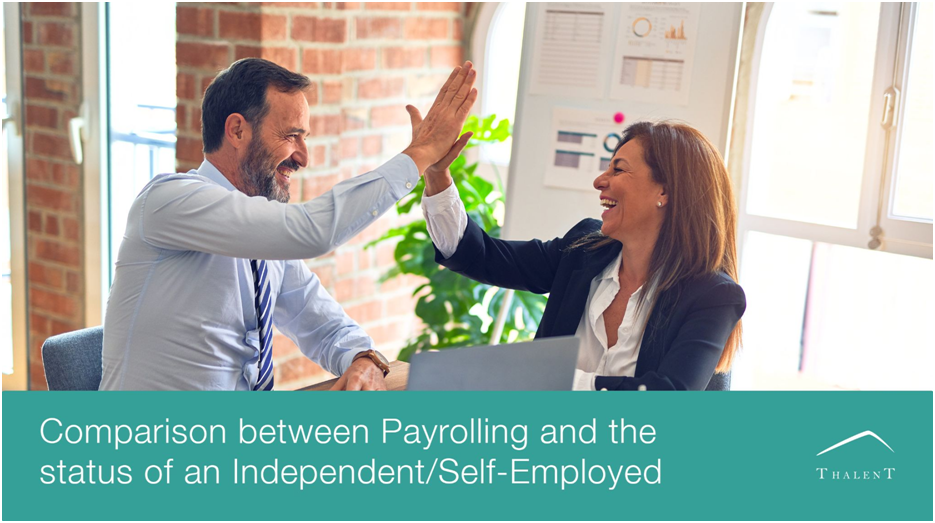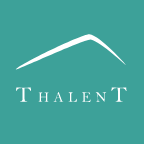
status of an Independent/Self-Employed

Here is Thalent.com’s comparison between Payrolling and the status of an Independent/Self-Employed. It will help you see the differences between the 2 forms of work.Do you have any questions? Request a free consultation or contact us for more information : Tel: +41 22 341 24 28. This comparison table is also available in a downloadable and printable .pdf version.
| Payrolling, WagePortage | Independent/ Self-employed | |
|---|---|---|
| Administrative | ||
| Obtaining a status | At the signing of the contract with the umbrella company, the payroll service company. | Obligation to have one’s status recognised by the compensation office. It checks whether self-employed status can be granted according to the criterias, which emanate from Federal Law on Old-age and survivor’s insurance, and rules of Federal Social Insurance Office (FSIO) and the case law of the Federal Supreme Court of Switzerland (TF). |
| Documents to be completed | The information to be provided and the documents to be completed are as follows:
– General information form provided by Thalent.com |
To become self-employed, you must fill in a membership form available on the website of the compensation office. You will need to send documents such as copies of invoices already drawn up, agreements concluded, offers made, your letterhead, rental agreement or liability insurance (RC) must be provided. |
| Do you have to have worked before? Do you need to be able to issue invoices? |
Not obligatory. | Yes, you must be able to prove to the compensation office that you have already started your activity by means of invoices, contracts and other documents requested at the time of affiliation. It is recommended to have one’s self-employed status recognised as soon as possible in order to benefit from coverage as soon as possible. |
| VAT, declarations linked to the company’s activity | The freelance Consultant using “Wage Portage” does not have to make a VAT declaration, nor a declaration linked to the business. He or she is an employee of the Payroll company which carries out all these tasks. | Self-employed persons with a turnover of more than CHF 100,000 are subject to VAT, except in certain sector (e.g. insurance, health or agriculture). They must register with the Federal Tax Administration (FTA). |
| Person-related declarations (work permits for foreigners, calculation of withholding tax, family allowances, etc.) | Umbrella or Payroll companies such as Thalent.com deal with applications for work permits, or applications for family allowances, which is a great time saver. | Obtaining a self-employment permit is not easy: you have to present a business plan to the cantonal administration, which may simply refuse to grant you the permit. The procedures relating to family allowances are also the responsibility of the self-employed person. |
| Account keeping obligation | The payroll, or wage portage company will take care of it for you. | Below CHF 500’000 turnover, simplified accounting (assets and liabilities, statement of entries and exits, statement of withdrawals, private contributions) is required from self-employed persons.
Above this threshold, full accounting (balance sheet, income statement and notes) is required. |
| Registration in the Commercial Register | No. | Not mandatory. |
| Payrolling, WagePortage | Independent/ Self-employed | |
|---|---|---|
| Social security and accident insurances | ||
| Accident insurance: Covers occupational and non-occupational accidents and occupational diseases | Covered for the freelancer by the payroll, umbrella company. | It is advised to do so, but freelancers are free to take an insurance or not. |
| Insurance for loss of income: Allows you to receive your salary in the event of illness |
Covered for the freelance Consultant by the payroll, umbrella company. | It is advised to do so, but freelancers are free to take an insurance or not. |
| Professional civil liability insurance: covers material damage and personal injury caused to third parties in the course of a professional activity. Depending on the activity carried out, some insurances are compulsory (civil liability, fire insurance), others optional (legal expenses insurance, theft, etc.). |
Covered by the payroll, umbrella company. | The self-employed are themselves liable for any damage caused to their clients.
It is advisable to be insured, but self-employed persons are free to take out insurance or not. |
| Unemployment insurance / ALV
The CA covers between 70% and 80% of the insured earnings in case of loss of work. Benefits are paid in the event of unemployment, suspension of work due to bad weather, reduced working hours and when the employer is insolvent. |
As he has an employee contract, the payrolling consultant contributes and benefits from unemployment insurance. | The self-employed person cannot contribute to public unemployment institutions.
He can do so with a private insurance company. |
| Disability Insurance DI/AI/IV A person is considered to be disabled if he/she is unable to earn a living, either partially or totally, as a result of a permanent or permanent impairment of his/her physical, mental or psychological health, or as a result of a congenital condition, illness or accident, or if for similar reasons he/she is unable to carry out his/her usual work (e.g. running the household). |
The freelancer using payroll services, wage portage contributes to the DI and therefore receives a pension in the event of invalidity. | The self-employed person contributes to the DI and therefore receives a pension in the event of invalidity. |
| 1st pillar pension plan: retirement Old-age and survivors’ insurance / OASI/AVS/AHV
It aims to compensate, at least in part, |
The payrolling consultant contributes to the OASI and will therefore be able to benefit from it when he retires. | The independent contributes to the OASI and will therefore be able to benefit from it when he retires. |
| 2nd pillar pension plan (OPP/LPP/BVG)
It is a funded pension system, with contributions being placed in a personal account that can be paid out at the time of retirement in the form of an annuity or a conditional lump sum. The OPP allows a pension to be paid in addition to the OASI, to help maintain an appropriate standard of living prior to retirement. |
The consultant using wage portage earning an annual salary in excess of CHF 21,510 is compulsorily insured under the OPP. | The self-employed person may optionally join a 2nd pillar pension scheme. This is not automatic and is compulsory but strongly recommended. |
| 3rd pillar pension plan which can be composed of :
a) Tied retirement savings account (3a) which is used to save for retirement. It allows you to save on taxes: payments can be deducted from your taxable income. |
Optional, of the responsibility and charge of the freelancer using the payroll service from the umbrella company. | Optional, of the responsibility and charge of the self employed person. |
| Legal expenses insurance | Optional, of the responsibility and charge of the payrolling consultant. | It is advised to have one in the event of a dispute, but optional. The self-employed person’s needs to pay for it. |
| Health Insurance (KV/AMal) It is compulsory for all persons resident in Switzerland. It guarantees everyone access to basic medical care in the event of illness, maternity or accident if accident insurance does not cover it. |
The person using wage portage has to pay for it. | The self employed has to pay for it. |
| Maternity or paternity leave and allowance (For fathers from 1 January 2021) Every mother and father who has a gainful activity (whether employed, self-employed, unemployed or working in her husband’s business) is entitled to paid maternity or paternity leave. In order to receive benefits, you must have been insured with the OASI/AVS/AHV during the nine months preceding the birth and have worked for at least five months during this period. |
Covered according to the OASI contribution. | Covered according to the OASI contribution. |
| Payrolling, WagePortage | Independent/ Self-employed | |
|---|---|---|
| Finances | ||
| Cash Management | The person will receive his salary at the end of the month while his customer will only pay his bill afterwards (e.g. 30 days standard). An umbrella company like Thalent therefore advances the cash, which is a great advantage. |
The self-employed person will have to wait for the payment of the invoice of his and his clients before being able to pay himself a salary. He manages his cash flow himself. |
| Social security charges and net income | The Consultant’s share of social security contributions (employee’s share) and the Payroll company/ umbrella company (employer’s share) are deducted from the invoice to his client(s) each month. This reduces the net income available to the consultant. |
The self-employed person is not obliged to contribute to the 2nd pillar pension scheme and does not contribute to unemployment. |
| Cost Management | Depending on the payroll company, some won’t handle it. It is the case though at Thalent. | Has to be managed by the self employed person. |
Get this comparison table in a downloadable and printable .pdf version !

